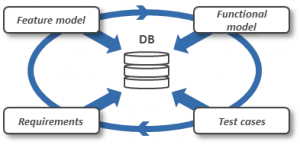
The artshop model repository
The artshop website has moved and is now reachable under http://artshop.embedded.rwth-aachen.de
The artshop model repository is a framework to manage software design artefacts in a central database. The key idea of this framework is the integration of software design artefacts created during standard model-based software development processes and perform a myriad of inter- and intra-artefact analyses. In its current version it supports basic auditing, traceability, variability, conformity and consistency management of a variety of software design artefact from the automotive domain.
History & artshop 1.0
In 2012 Dr. rer. nat. Daniel Merschen started developing a database backed model analysis framework which first mainly focused on the analysis of Matlab Simulink models. This framework was later extended with additional software design artefacts like feature models from S2T2 Lero and requirements/test descriptions exported from IBM Rational Doors. In addition, techniques for traceability and variability management were introduced to the framework. In early 2013 a graphical user interface based on the Eclipse Rich Client Platform was created, where all techniques were pooled and accessible in an easy manner. After that techniques for change and dependency analysis were added to the framework, but it soon became apparent that the underlying technologies were not suited for such techniques and therefore a clean cut in the underying api was needed. The artshop team decided to move on to the next major version and rebuild the foundation of the model repository framework with new and emerging technologies.
artshop 2.0
For the second major revision of the artshop framework it was decided to use the Eclipse Modeling Framework (EMF) as the foundation of the framework because of its formal object representation and the amount of technologies that build on top of it, e.g. the Epsilon framework and a multitude of repository techniques. Version 2.0 of the artshop model repository framework uses the Connected Data Objects (CDO) framework as the repository backend, which supports a variety of database stores for easy exchangeability and basic support for auditing.
Architecture
To illustrate the architecture of the artshop model repository framework take note of the figure below which shows the current components integrated into the framework. The core represents the model repository and the implemented services which handle persisting and updating the loaded design artefacts. The interface to the tool environment is represented by the artconnect component which either establishes a direct connection to the supported integrated development environemnts (IDE) or plainly imports supplied model files. These components also include abstracted data models for the imported development artefacts which inherit certain properties from a superordinated metamodel. The management and analysis components dirctly plug into existing data formats and work on the previously mentioned metamodel.

Features
The artshop model repository framework 2.0 currently supports the following software design artefacts from the automotive domain:
- Matlab-Simulink/Stateflow
- IBM Rational Doors (Formal modules)
- pure::variants (Feature models, family models, variant configurations)
Analyses of these artefacts adress the following areas:
- Traceability management
- Variability management
- Rule-based conformity checking
- Consistency checking of annotated meta information like semantic associations between design artefacts
- Inter-artefact dependency checking
- Clone detection for Matlab-Simulink Models
Contact
Publications
